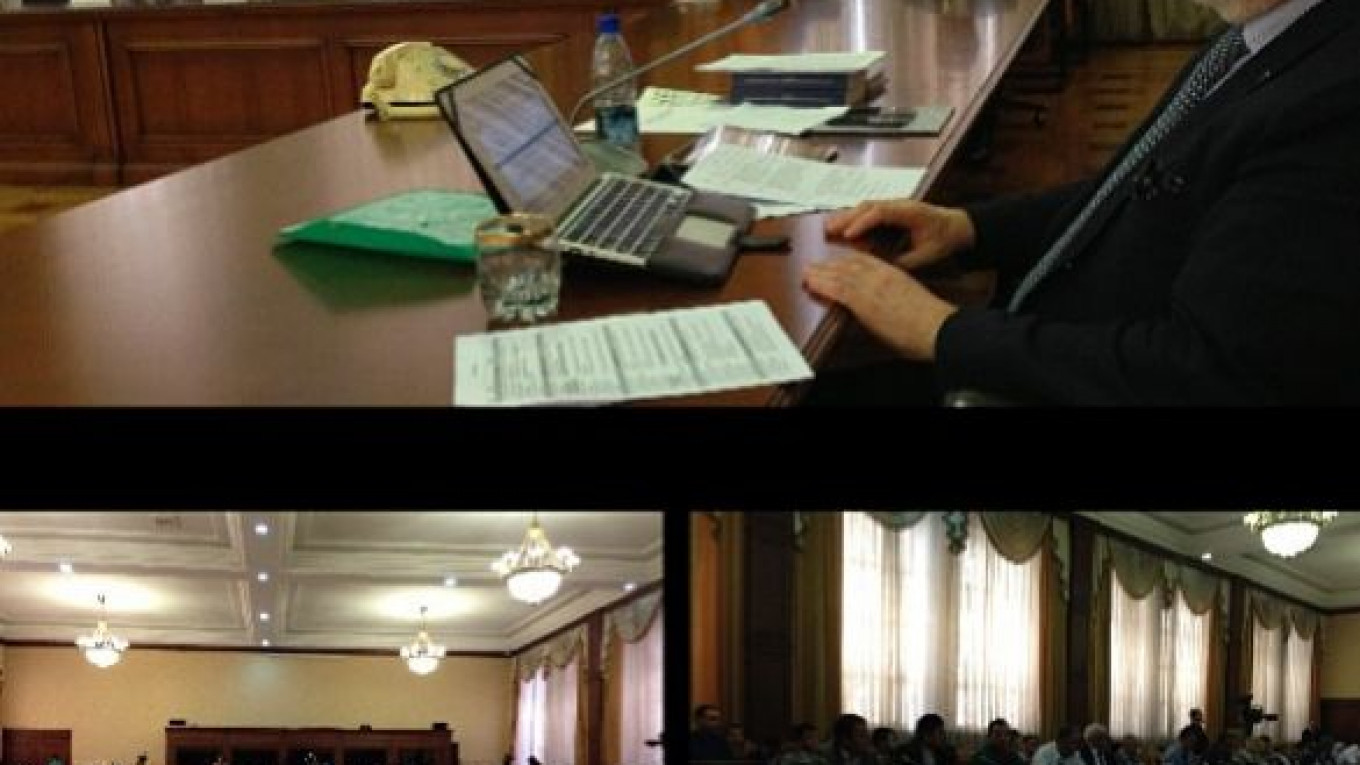During the Second Chechen War, witnesses described Chechnya's Chernokozovo prison as a place where suspected Chechen rebels were tortured until their relatives paid a bribe sufficient for their release. Prisoners arriving at the facility were greeted with the phrase "Welcome to hell" and subsequently forced to undergo a series of blows by baton-wielding guards.
But on a recent trip to the prison, the single complaint Kremlin human rights council head Mikhail Fedotov heard from Chernokozovo prisoners was that Winston cigarettes cost five rubles more in the prison shop than in the local town. Inmates enjoyed the comfort of single-deck beds in cells that, according to Fedotov, are "not very crowded."
Conditions at Chernokozovo are in many ways emblematic of changes Chechnya has undergone in the years following the wars, members of the Kremlin human rights council said Wednesday at a news conference describing their observations from a recent trip to the formerly war-torn North Caucasus republic.
The council members went on a tour of Chechnya to hold a meeting with representatives of all the North Caucasus republics and to investigate the situation on the ground.
They said that while they did still observe problems, they were not of the sort one might expect in a republic that still has 5,000 people missing from two devastating wars of independence fought there in the last two decades.
One of the main reasons for these dramatic changes, the council members said, is that Chechen leader Ramzan Kadyrov is personally involved in every minute aspect of governance.
The Chernokozovo detention camp, for instance, was transformed into a modern, high-security prison, with Kadyrov personally involved in managing it.
Fedotov said the town surrounding the prison had also been modernized. "The houses look good, the fences are painted, while in the First Chechen War there were bloody battles there."
Despite the facelift, Kadyrov is still a highly controversial figure, with many human rights activists saying he is personally implicated in many instances of torture and murder, including assassinations of high-profile Chechens who opposed him from abroad. Kadyrov has denied wrongdoing.
One could easily suspect that members of the Kremlin rights council were presented with Potemkin villages, but, according to Fedotov, the changes were genuine.
Some obstacles to finding out the true conditions on the ground did remain during the council members' trip. Sergei Krivenko, a council member from rights group Memorial, said that on his visit to a military base in the village of Kalinovskaya, he discovered that half its soldiers had been sent away from the barracks for exercises to avoid being interviewed by the guests from Moscow.
Speaking on another significant post-war issue, Yelena Topoleva-Soldunova, director of the Agency of Social Information, said she was impressed by the fact that there were no orphanages in Grozny.
"The clan-based 'teip' culture manifests itself everywhere in Chechnya, but I was very impressed that no orphans are abandoned in Chechnya. It would be shame for their relatives not to adopt them," she said.
At the same time, according to Topoleva-Soldunova, Kadyrov does not yet understand what kind of benefits nongovernmental organizations can provide, and thus "a lot of work needs to be done in this direction."
One of the ways Kadyrov is able to control the situation is through modern social networks, the council members said. Because of Kadyrov's avid use of photo-sharing service Instagram, on which Chechens can write to him with complaints, local officials are terrified of being called out and dismissed.
While the council members were able to travel around Chechnya, they were unable to observe the situation in the rest of the North Caucasus, including in neighboring Dagestan, which is currently the most violent part of the region.
Speaking about Dagestan, Fedotov said that another another council member, Maxim Shevchenko, was currently there investigating the situation on the ground.
Contact the author at i.nechepurenko@imedia.ru
A Message from The Moscow Times:
Dear readers,
We are facing unprecedented challenges. Russia's Prosecutor General's Office has designated The Moscow Times as an "undesirable" organization, criminalizing our work and putting our staff at risk of prosecution. This follows our earlier unjust labeling as a "foreign agent."
These actions are direct attempts to silence independent journalism in Russia. The authorities claim our work "discredits the decisions of the Russian leadership." We see things differently: we strive to provide accurate, unbiased reporting on Russia.
We, the journalists of The Moscow Times, refuse to be silenced. But to continue our work, we need your help.
Your support, no matter how small, makes a world of difference. If you can, please support us monthly starting from just $2. It's quick to set up, and every contribution makes a significant impact.
By supporting The Moscow Times, you're defending open, independent journalism in the face of repression. Thank you for standing with us.
Remind me later.






